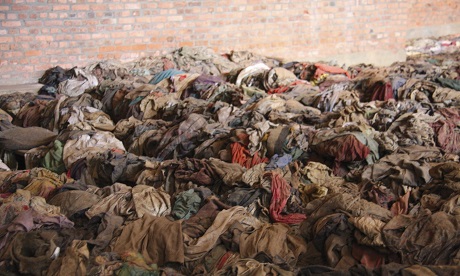Rwanda’s genocide of 1994 resulted in over 800,000 deaths. Most were ethnic Tutsis and moderate Hutus.
Their killers were extremist Hutus who were Catholic Church members. They planned, helped with and carried out the genocide.
The Rwanda Conference of Catholic Bishops has just admitted and apologised for its role in the massacres.
“We apologize for all the wrongs the church committed. We apologize on behalf of all Christians for all forms of wrongs we committed.
“We regret that church members violated (their) oath of allegiance to God’s commandments,” said the statement, which was read out in parishes across the country.
The public statement is the first time the Church has admitted its role in the killings.
Until now it has denied it was involved in organised massacres.
Rather, it said the acts of genocide were undertaken by individuals.
Many victims were killed by priests, nuns and other clergy. Many died when they sought refuge in churches.
St Pope John Paul II was the first to officially condemn the atrocities.
He referred to them as a genocide and said those responsible would be held accountable by God and history.
In 2005 Pope Benedict challenged Rwandan Bishops to face the truth, confront their history and all consequences that may arise.
Then in 2014, Pope Francis told the bishops to “work closely with government and help Rwandans not to be held back by genocide against Tutsi and its effects.”
The murderous behaviour of some ordained and professed members of the Church has created a rift between those who took part and those who didn’t.
“Forgive us for the crime of hate in the country to the extent of also hating our colleagues because of their ethnicity.
“We didn’t show that we are one family but instead killed each other,” the statement said.
The statement was timed to coincide with last Sunday’s formal end to the Jubilee Year of Mercy.
The Holy Year of Mercy was declared by Pope Francis to encourage greater reconciliation and forgiveness in the Church and in the world.
Source
